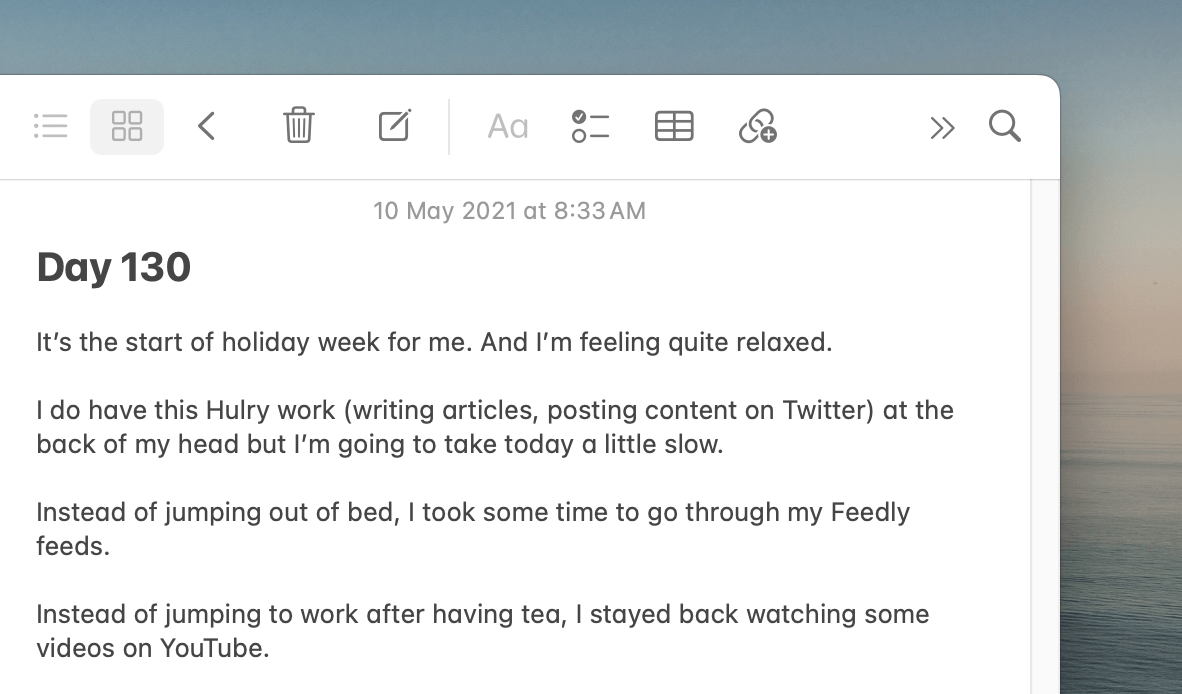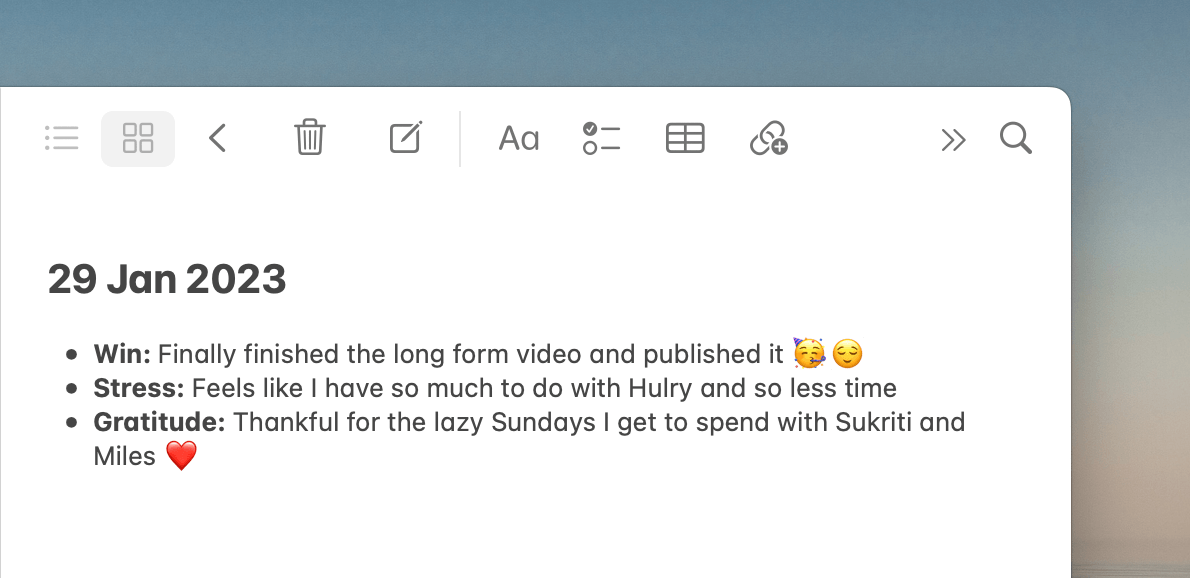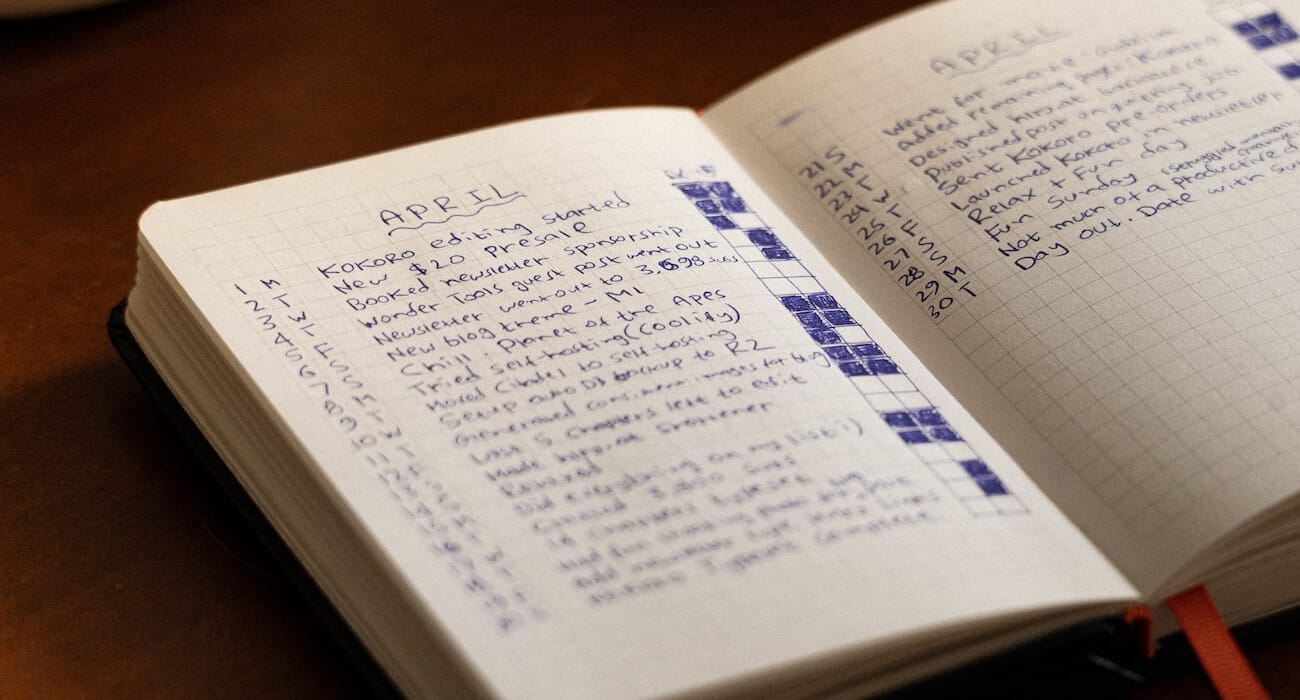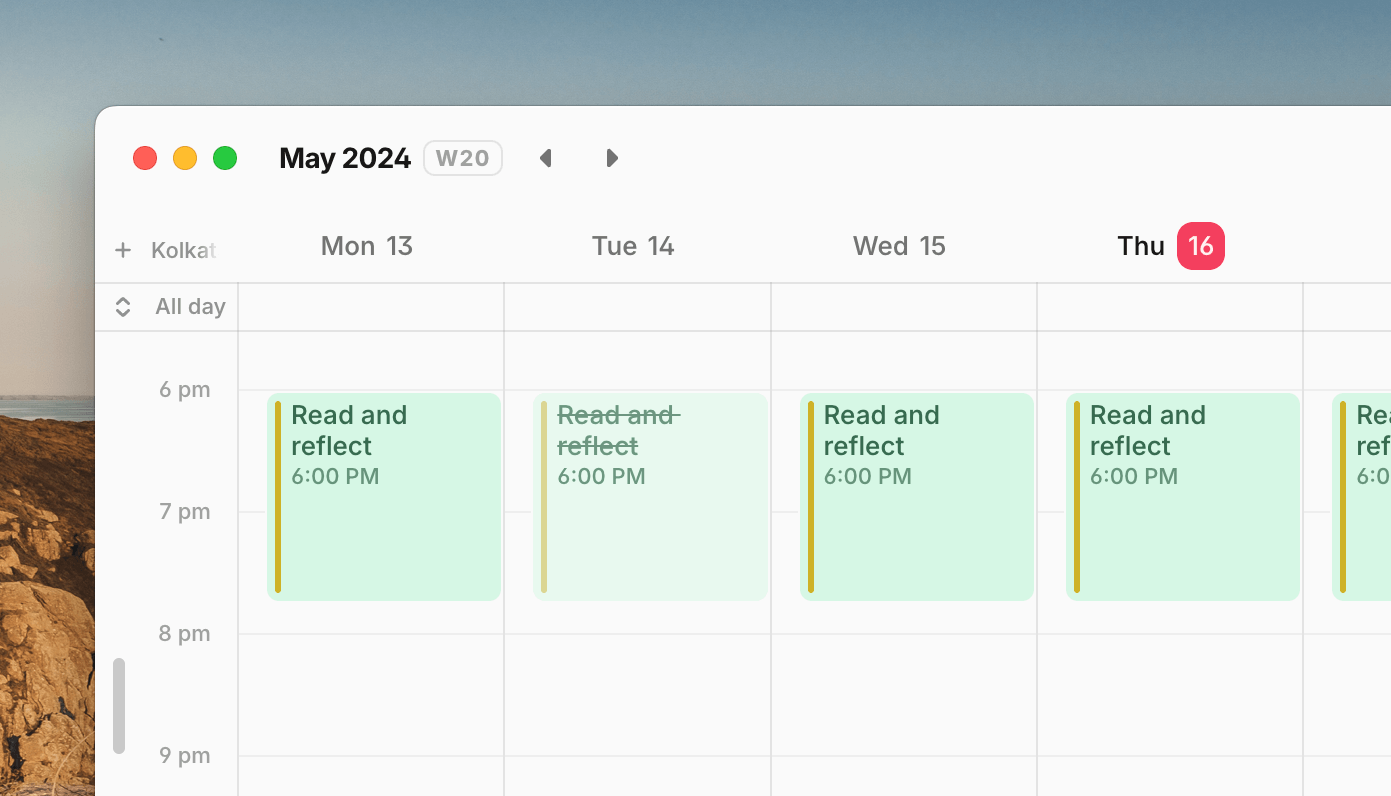From books to countless blog posts, habit-building is advertised as a disciplined process of taking tiny steps regularly over a period of weeks or months.
Some even say you can build a habit by doing something for over 21 days.
While some of these claims have substance, and indeed, building habits starts with tiny steps, this isn't the whole story.
I've tried following this advice, only to fail many times and be demotivated in the process.
In this blog post, I'll share how relying on discipline and willpower alone to build habits doesn't work and what we can do instead to have a better chance at success.
Let's start with the story of how:
I failed to build a journaling habit
Over the last few years, I've had my fair share of attempts to build a regular journaling habit.
I understood the merits of journaling and wanted to reap the benefits of this habit. Moreover, it didn't seem too challenging.
Write about your day on a piece of paper. How hard could it be?
Only, it wasn't as easy as I had expected.
I began by doing freeform journaling, writing whatever came to my mind about how the day went.
There were no formats to follow, no guidelines and no target word count — a fresh note with the date as the title and a blank canvas to pour my thoughts out:

As I had written about this experience earlier, journaling freeform worked well for a while. I followed it for months, filling a folder with interesting retrospectives.
But then I stopped.
It felt too cumbersome to continue, and the blank canvas felt intimidating.
Um, let's see. What do I write in my journal tonight?
With a heavy resistance to starting and being already exhausted from the day's work, cracks began to form in my journaling habit.
I missed one day. One day became two. And then, the habit died.
Then, years later, I gave journaling another try through a different format.
This time, I drew lessons from my past attempt and aimed to constrain this exercise using a fixed format. Instead of following a structureless journaling style, I followed the 1-1-1 journaling method.
In this style, I had a template to begin with and wrote 1 win, 1 source of stress and 1 sense of gratitude I had in the day:

It worked — at least until I practised it.
This style was efficient. I didn't have to start with a blank slate and think about what to write. And the format was clear enough to give me actionable feedback from the past.
But unlike my previous attempt, this one faded away faster. I only did the 1-1-1 journaling for a few weeks and then gave up.
Again, it felt like doing a chore at the end of the day that I could just avoid.
My third and most recent attempt was this year. I started using a paper notebook to write one highlight from each day and tracked the progress of two of my daily habits: reading and working out at the gym:

I saw this journaling method on a YouTube video, and it seemed like a less cumbersome way to knock two birds with one stone — I could note an exciting highlight from each day and track how well I've kept up with my habits.
And I did.
I followed this method religiously for about two months. Then, as you might've guessed, I fell out of practice.
I missed one day but made up for it the very next day. But then I started missing multiple days, and soon, I didn't feel like returning to this habit.
Now, contrary to standard advice, discipline was not the problem here.
As with all my habits and other activities, if I buy into a vision, I'm disciplined enough to see it through.
Hulry is an example. Running this blog for the last four years hasn't been without turbulence. But being completely sold on this project, I've been able to weather the storm and keep the project running.
So, what was the root cause here?
Not understanding why
Journaling was not a natural "aha" moment for me. I started journaling because after reading probably a hundred articles on this practice, it seemed solid on the surface and something I should try.
The benefits were apparent. I could peek into my past self, learn from my mistakes, and do more of the things that make me happy.
But, like that Udemy course I bought on sale and never opened, journaling didn't stick because I didn't have a clear goal.
I wasn't clear on why I wanted to follow this arduous practice or what I wanted to gain from it.
For years, I've been frequently introspective about my major milestones, actions, and decisions during my free time.
These are my "walk-and-think" moments.
What would journaling add to my existing process that it's worth spending 5–10 minutes of my time and a herculean effort every day for years?
It felt like an overhead on my time and effort without any visible impact on my life. And this is where the practice collapsed.
Building a habit is daunting enough. You have to muster every ounce of willpower and discipline to try and convince your mind to do something it resists doing.
Without a clear reason or intrinsic motivation, this process is rarely successful. Discipline and willpower fade away, and with it, the habit itself.
My discipline and willpower lasted only a few weeks or months at best because, deep down, I wasn't completely sold on this habit.
Had I been clear on why I wanted to incorporate this habit into my daily routine and how it would've helped me in return, the process would've lasted years, if not decades.
Here's why:
When willpower falters and you feel like giving up, your intrinsic motivation, or "the why", will be that gentle push that keeps you going.
Your "why" will be the inner voice that gets you to put on your running shoes and go for that run when your devious mind tells you it's okay to let go because it's not worth the trouble.
And this is exactly:
How I fixed my broken sleep schedule
For most of last year, I was stuck in a loop of a broken sleep cycle.
I woke up late, around 7:30–8 AM, got exhausted throughout the day, did some revenge bedtime procrastination, and slept late every night.
And the cycle continued.
Sure, on some days, I felt guilty about waking up late and not having time to work on Hulry before leaving for the office, but it didn't translate into a better schedule.
I still woke up late every day.
But after I moved to work full-time on Hulry this year, my sleep schedule naturally altered.
I sleep by 10:30 PM every night and wake up around 5:30 or 6 every morning. On some days, when it's raining outside, and the weather is unreasonably cosy, I might wake up at 6:30 AM, but no later than that.
What changed?
Before your mind goes in that direction, no, I didn't start cutting my caffeine consumption or taking melatonin pills. Actually, I rarely drink coffee.
I changed my sleep schedule because I clearly understood why I wanted to do it.
I wanted to start working on Hulry projects no later than 8 AM Monday through Saturday to dedicate as many productive hours as possible to my work. This meant I had to wake up at 6 AM to have enough time to freshen up, take my dog for a walk, and ease into my work schedule.
Backtracking this wake-up time and a desire to sleep at least 7 good hours, I made a pact with myself to sleep no later than 10:30 PM every night.
I exceed this time occasionally if I'm too hooked on a chapter of the fiction novel I'm reading before bed, but 10:45 PM is the cut-off.
It's been six months since, and there have been only two or three weekdays when I've woken up beyond 6:30 AM.
Discipline alone couldn't have done this.
Many days, I felt like sleeping in a bit extra because of how cosy lying in bed felt, but I woke up on time because I had my motivation clear — start working on Hulry no later than 8 AM.
Even today, I woke up at 6:05 AM and stayed in bed till 6:25 AM because it felt good. But then I got up, did my morning business and sat down to work on Hulry at 8:10 AM.
Ten minutes later than usual, sure. But not too late.
Compared to last year, I miserably failed to wake up early because, underneath, I didn't want to wake up earlier.
I wasn't convinced about "the why".
I was going through a rough patch at work, and lying in bed for that extra hour meant I could defer my problems for a little while.
This was primarily the reason my work on Hulry stalled last year. I didn't have the time in the morning, and when I got back home, I was exhausted.
No amount of willpower was enough to get me springing out of bed at 6 AM because I had no intrinsic motivation.
Why should I wake up early? What would I gain from waking up at 6 AM except an early rush of work stress?
I had a similar experience following through on my regular workout practice.
I had tried many times last year to establish a regular habit of going to the gym.
The timing was tricky since I left for work early in the morning, and by the time I returned home, I was too exhausted or needed time to work on Hulry because I had a deadline approaching. But more importantly, I was missing the why behind this practice.
Going to the gym seemed like a good habit. Everyone recommends it, and I, too, know it's good for me. But the motivation was external.
It was good on paper, but I didn't know why I wanted to do it.
However, after months of feeling too lethargic and rusty and suffering chronic back pain, I knew I had to act before it was too late — a Kansha moment.
I didn't want to feel like a 60-year-old in my thirties. And neither did I want to succumb to a buffet of illness as I grew older.
I had found my why.
And with it, I established a regular workout routine I had rarely skipped in the last six months.
I went to the gym on good and bad days. And it didn't feel like I was dragging myself to the gym like a parent dragging their child to school who's definitely in a holiday mood.
I genuinely wanted to put on my workout clothes and go to the gym for an honest workout because the motivation was clear — not let my body collapse due to negligence.
So, before you get pumped up wanting to start a new habit:
Start with the why
Ask yourself:
Why do you want this habit? What are you looking to gain out of it? How would this habit help you in the long run?
A blog post or a book explaining why you should start a new habit will not have as deep of an impact as your personal reasons.
For example, almost everyone knows reading is good for the mind and often the soul.
I, too, know this and aim to read every day. Moreover, I enjoy reading, so it's a bonus for me.
But as things piled up in my daily routine last year, I deprioritised reading for other undone chores. Reading became a luxury I could do occasionally when I had ample time.
Now that I regularly write blog posts, book summaries, and newsletters on Hulry, reading is a non-negotiable habit in my routine:

Why?
Because I need to read to get more unique ideas to write about, write book summaries, and find articles to recommend in the Hulry newsletter every week.
Without reading new blog posts and books daily, I won't be able to do any of these things. So, a habit that was once a luxury became a necessity and is a hundred times easier to follow through.
Try this:
Before starting a new habit or even one you're struggling to keep up with, ask yourself why you want to do it until you're clear on your reason and motivation.
Once you know the reason, sticking to a habit when you don't feel like it would be many folds easier.
Your intrinsic motivation will be the push you need when things get tough.
Good luck.



 In-depth articles, series and guides
In-depth articles, series and guides
